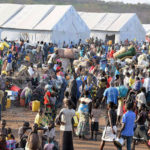Mozambique has kicked off a cholera vaccination campaign targeting around 720 000 people in eight districts as the country steps up control measures against an outbreak in which 5260 cases and 37 deaths have been recorded to date since September 2022.
People aged one year and older will be vaccinated in the five-day campaign, which started just 10 days after the country took delivery of vaccine doses. Alongside the vaccination campaign, health authorities are also reinforcing disease surveillance, prevention and control measures, treatment as well as raising public awareness to curb the spread of the disease and end the outbreak.
“The vaccination campaign will be crucial in stemming the spread of cholera and help save lives,” said Dr Severin von Xylander, World Health Organization (WHO) Representative in Mozambique. “We are also working with the health authorities to bolster key outbreak response measures and have deployed staff in the three most affected provinces to support the provincial health authorities to detect, prevent and halt cholera this outbreak.”
WHO has also disbursed US$ 856 000 to support the response in Mozambique and provided medical supplies and medicines. Mozambique recorded a sharp increase in cases since mid-December 2022. Cholera has so far been reported in five of the country’s 11 provinces. The northern Niassa, Sofala and Tete provinces are the worst affected.
During the vaccination campaign vaccinators will use a mixed approach of vaccinating patients in health centres, through mobile teams and by door-to-door visits. Oral cholera vaccines will be used in conjunction with improvements in water and sanitation to control cholera outbreaks and for prevention in areas known to be high risk for the disease.
“We celebrate the launch of this vital immunization campaign alongside the Government of Mozambique and our Alliance partners.” said Thabani Maphosa, Managing Director, Country Programmes Delivery at Gavi, the Vaccine Alliance. “The recent rise in disease outbreaks and the risks they present demonstrate the importance of our work in funding the Global Oral Cholera Vaccine Stockpile, cholera response campaigns and access to outbreak response vaccines for diseases such as cholera, measles, yellow fever and polio.”
Despite a global shortage of cholera vaccines and increased demand due to a rise in outbreaks globally, WHO and its partners, including Gavi, the Vaccine Alliance and the Africa Centres for Disease Control and have been able to supply vaccines to countries most affected by cholera in the southern Africa. Mozambique received around 720 000 doses of the oral cholera vaccine.
The strain on the availability of vaccines prompted the International Coordinating Group (ICG) on Vaccine Provision to temporarily suspend the standard two-dose vaccination regimen in cholera outbreak response campaigns, using instead a single-dose approach. The ICG is an initiative which aims to manage emergency supplies of vaccines and is a partnership of the International Federation of the Red Cross and Red Crescent Societies, Médecins sans Frontières United Nations Children’s Fund and WHO.
Cholera is an acute, extremely virulent infection that can spread rapidly and cause dehydration resulting in high morbidity and mortality. However, the disease is easily treatable. Most people can be treated successfully through prompt administration of oral rehydration solution or intravenous fluids.
The disease is endemic in Mozambique and, together with other diarrhoeal diseases, is a major cause of infant death. There are yearly outbreaks in the country’s northern provinces.
Cholera transmission is closely linked with poor sanitation and inadequate access to safe drinking water. Extreme climatic events such as droughts and floods are worsening the cholera risks. In Mozambique, floods due to the current rainy season have affected over 39 000 people, claimed nine lives and caused extensive damage to infrastructure, including roads, bridges, health centres and 76 000 homes.








